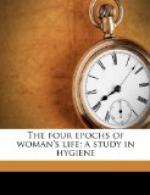In the case of a syphilitic parent, one or two children may be born, but the offspring is generally sickly and diseased. Inebriety as well as sexual excesses are both well recognized as distinct forms of disease accompanied by degeneracy of brain tissue. It is nothing less than criminal for such men to have children, since these children would at least inherit the tendency to the same diseases, if they did not actually have them; there is also a strong probability of such children being born idiots or imbeciles.
It is therefore self-evident that, instead of a reformed profligate making a good husband, he must make a very diseased one. It has therefore been suggested that the parents of the prospective bride should demand from the intended groom a certificate of freedom from all venereal diseases by a physician of their own selection. Also that there should be legislation upon the subject, and that before a man is granted a license of marriage, he should have a certificate from the health officer of freedom from syphilis, gonorrhea, and tuberculosis.
The Proper Length of Time for the Engagement.— A period not shorter than three months, nor longer than one year, should elapse between the engagement and the marriage.
There are strong physiologic reasons against long engagements: they keep the affections and the passions in an excited and unnatural condition, which after a time tends to weaken the nervous system and undermine the health. These evil consequences are common to both sexes. It is far better that the subject of marriage should not be entertained at all unless the circumstances are such that the union might with propriety be effected at once.
The Right Time of the Year to Marry.— When woman marries she enters upon a new life, and a very trying one. Extreme heat and extreme cold are both very taxing to the human economy. Midsummer and midwinter are therefore both objectionable, but especially the former.
The Selection of the Wedding-day.— This is by common consent left tothe bride. She should select a time about ten or fifteen days after the end of one of her menstrual periods, as this is the time of comparative sterility, and it is most desirable that the first sexual relations should be fruitless.
_________________
Part II.— Marriage. _________________
CHAPTER VII.
THE ETHICS OF MARRIED LIFE.
The Wedding Journey; the Ethics
of Married Life; Shall Husband and Wife
Occupy the Same Bed? the Comsummation of Marriage;
the Marital Relation;
Times when Marital Relations Should be Suspended.
“If it is possible to perfect
mankind, the means of doing so will
be found in the medical sciences.”—
Descartes.
The Wedding-journey.— The wedding-journey, which was formerly the cause of so much discomfort to both husband and wife, has fortunately gone out of vogue; and in its place has come the retirement to a quiet country or seaside spot, away from the prying eyes of friends. Thus the nervous strain incident to sight-seeing and travel is avoided.




